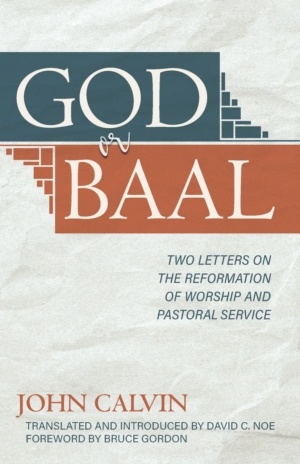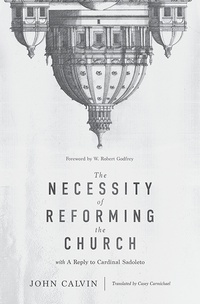40. Why was it necessary for Christ to suffer “death”? Continue reading →
Author Archives: R. Scott Clark
What Is Your Only Comfort In Life And In Death?
What is your only comfort in life and in death?
Continue reading →
What If The Roman Communion Had No State Or Bank?
This past Thursday, senior figures associated with what Rome calls the “Institute for Religious Works” (known to the rest of the world as the Vatican Bank) were convicted, in a scheme worthy of the Mafia, of money laundering and embezzlement. Remarkably, they . . . Continue reading →
Orwell: On Opposing Hitler At The Price Of Accepting Stalin
Secondly there is the fact that the intellectuals are more totalitarian in outlook than the common people. On the whole the English intelligentsia have opposed Hitler, but only at the price of accepting Stalin. Most of them are perfectly ready for dictatorial . . . Continue reading →
New Resource Page: On The Threefold Division Of The Law
The early Christian theologians implicitly distinguished within the 613 Mosaic Commandments (as the rabbis numbered them) between the judicial, ceremonial, and moral law. The moral law refers to the natural law, the law issued in creation and symbolized by the commandment not . . . Continue reading →
From A Former Insider: How Cosmo Sold The Lie Of The Sexual Revolution To Middle America
Before Facebook Cosmo Made You A Commodity
Ps. Rome is not your home. Resources How To Subscribe To Heidelmedia How to support Heidelmedia: use the donate button below Heidelblog Resources Heidelmedia Resources On Roman Catholicism Two Dark Sides Of The Sexual Revolution (UPDATED) Reno: Consequences Of The Institutionalization Of . . . Continue reading →
Of QAnon, Calvin, And the LA Times
It is a deep animus that would seek to tie John Calvin (1509–1564) to the QAnon-fueled wackos who stormed the American capitol earlier this month but that is what Richard Hughes tries to do in a recent editorial in the Los Angeles . . . Continue reading →
Luther Challenges The (Ana)Baptist Interpretation Of Mark 16:16
In the third place, it is said, as I also have read, that they base their faith on this verse, “He who believes and is baptized will be saved” [Mark 16:16]. This they interpret to mean that no man should be baptized . . . Continue reading →
Calvin: Circumcision Was Spiritual And Substantially Identical To Baptism
But since before baptism was instituted God’s people had circumcision instead, let us examine how these two signs differ from each other, and in what respects they are alike. From this will appear the anagogic relationship of the one to the other. . . . Continue reading →
Whose Kingdom, Which King, And Why Do The Nations Rage?
The first time I remember reading Psalm 2 it was in my hometown newspaper, now known as the Lincoln Journal Star. If memory serves, it appeared every week, probably in the Sunday edition, which, as every paper carrier knows, is the largest . . . Continue reading →
Trueman: Critical Theory Is Self-Certifying And Resistant To Evidence
Critical race theory, like other critical theories—postcolonialism or queer theory, for example—is self-certifying. Its basic claims, for example, that racism is systemic or that being non-racist is impossible, are not conclusions drawn from arguments. They are axioms, and they cannot be challenged . . . Continue reading →
They Do Not Have God’s Word In Their Mouths
Christians should not think that the failed New Apostolic Reformation “prophets,” who falsely predicted the presidential race, are unique. They are not. Continue reading
Next To Be Banned?
There would be no end to what could be censored. Trans-sceptical feminists, already victims of Silicon Valley’s woke purges, would be completely wiped out on the basis that some idiot might interpret their intellectual, non-bigoted critiques of genderfluidity as an instruction to . . . Continue reading →
Time To Learn (Or Relearn) How To Communicate Without Big Social Media?
In the wake of the events in Washington, D. C. this week there seems to be a crackdown on social media. It appears that a significant number of users are being removed from Big Social Media platforms. Parler, reports that their app . . . Continue reading →
Ursinus: The Holy Spirit Uses The Word To Create Faith And The Sacraments To Confirm Faith
The Word is that through which the Holy Spirit commences and confirms faith in us, and for this reason, should go before the sacraments. The sacraments are means through which the Holy Spirit confirms faith already called into exercise, and for this . . . Continue reading →
Some Reasons Why Visitors Do Not Stay And What To Do About It
Presbyterian and Reformed congregations occupy an odd space in American Christianity. We do not really belong to American Christianity in significant ways. Our roots are not in the nineteenth-century revivals nor even in the eighteenth-century revivals. We are no part of the . . . Continue reading →
Heidelcast 169: As It Was In The Days Of Noah (15): Living Among The Pagans
The chapter divisions we see in our Bibles were not present originally. Stephen Langton (c. 1150–1228), a Paris theologian and, later, Archbishop of Canterbury, is usually credited with introducing the divisions that we know. This is one place where we see the . . . Continue reading →
A New Calvin Title In English: God Or Baal—Two Letters On The Reformation Of Worship And Pastoral Service
The French “Nicodemites” have long been an interest on the HB. I first wrote about them here in 2009, from which I borrow here to give some background by which to understand the value of a first-ever English translation of two early . . . Continue reading →
Americans Are Going Home. Maybe It Is Time To Think About About Planting Churches There Too?
Some dear friends left their life in the city and moved back home a few years ago. They live in his Mom and Dad’s place in the Sandhills of Nebraska. North Platte (pop. 23,000), a hour to the south, is the nearest . . . Continue reading →











